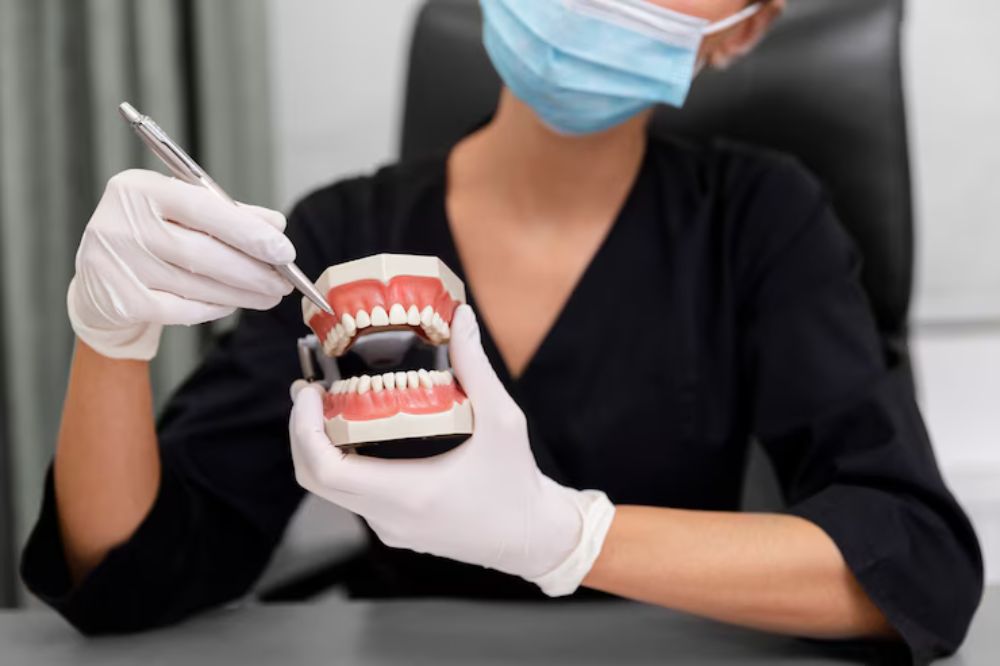
Dentist near you have changed and advanced modern dentistry itself, offering a permanent choice for missing teeth. Whether you have lost a tooth due to an injury, decay, or gum disease, dental implants are a beautiful, natural-looking, and permanent option. However, one of the first two or three questions that preliminary talk about getting an implant usually brings up is ‘How long will implants last?’
In this blog post, we are going to discuss how long they last, things that contribute to longevity of implants, and how to work toward keeping your dental implants as long as possible.
Understanding the Components of Dental Implants
Before we discuss longevity, let’s examine what a dental implant consists of. A dental implant has three main components:
- The Implant Post: This is the titanium or zirconia screw placed in the jawbone surgically and substitutes as an artificial root.
- The Abutment: The connection piece placed on the top of the implant post that retains the crown.
- The Crown: This is the only component that one can visually see, which looks and acts like a natural tooth.
Each component plays an important role in securing the dental implant and helping it to function properly for years.
How Long Do Dental Implants Last?
Typically, dental implants near you, when cared for appropriately, may last for 20 years, or for a lifetime.
However, this can depend on various elements, which may include the quality of the implant, your oral hygiene, and your lifestyle.
Lifespan of Different Parts of a Dental Implant
Implant Post
If properly maintained, the titanium or zirconia implant post can last a lifetime. The post will last a long time because the post will bond with the jawbone in an integration process called osseointegration. After the post is totally bonded into your jaw, it will become a permanent aspect of your mouth.
Abutment
The abutment is capable of surviving for decades, but on rare occasions it may need to be replaced due to damage or movement.
Crown
The dental crown has a more limited lifespan, typically around 10 to 15 years, and almost always will need to be replaced due to wear and tear.
Factors Affecting the Longevity of Implants
Implants were made to last, however, there are several factors to help in longevity, such as
Oral Hygiene
- Like natural teeth, oral health is very critical in sustaining implants.
- Brushing at least twice a day, flossing once a day and using an antibacterial mouthwash are all very helpful in maintaining oral health and preventing implant infections, such as peri-implantitis, which will lead to implant failure.
Gum Health
- Having healthy gums is critical to provide a stable foundation for an implant.
- Gum disease can negatively impact the jawbone and gum tissue around the area of the implant and can increase the risk of implant failure.
Bone Density
- A strong and healthy jawbone is needed for the stability of your implant.
- Conditions such as osteoporosis or bone loss as a result of previous tooth extraction may impact how long the implant will last.
Lifestyle Choices
- Smoking and Tobacco Use: Smoking causes reduced blood flow to the gums and may slow the healing of the gum tissue following implant placement, as well as increase the risk of implant failure.
- Diet: Eating a healthy and balanced diet, rich in vitamins and minerals, contributes to bone and gum health, which helps provide longevity to the implant.
- Teeth Grinding: Excessive grinding or clenching puts stress on the implant and crown from the grinding habit, which causes premature wear on the implant and crown.
The Dentist’s Expertise
A well-placed implant by an experienced dentist has a much higher success rate. A poorly positioned implant may lead to complications, reducing its lifespan.
How to Make Your Dental Implants Last a Lifetime
Here are some key steps to maximize the lifespan of your dental implants:
- Maintain Excellent Oral Hygiene: Brush and floss daily, and visit your dentist regularly for professional cleanings and check-ups.
- Quit Smoking: Smoking delays healing and raises the risk of infection and bone loss around the implant.
- Protect Your Implants: If you grind your teeth at night, consider using a mouthguard to prevent excessive pressure on your implant.
- Follow a Healthy Diet: Eat foods rich in calcium and vitamin D to support strong bones and gums.
- Attend Regular Dental Checkups: Your dentist will monitor your implants for any early signs of complications and provide necessary treatments.
What Happens If an Implant Fails?
While the success rate for dental implants is more than 95%, there is always a slight possibility of failure. Signs of implant failure include:
- Pain or discomfort around the implant site
- Swelling or inflammation
- Loosening of the implant
If an implant fails, your dentist may remove it and explore options such as bone grafting before replacing it with a new implant.
Are Dental Implants Worth It?
One of the most natural-looking and long-lasting solutions for missing teeth is dental implants.
With proper care, they can last a lifetime, making them a valuable investment in your oral health and overall well-being.
At Devon Dental Associates, a trusted dental clinic in Devon, we specialize in high-quality dental implants with personalized care.
If you’re considering dental implants or have questions about their longevity, book a consultation with our expert team today. Let’s help you achieve a healthy, confident smile that lasts a lifetime!
